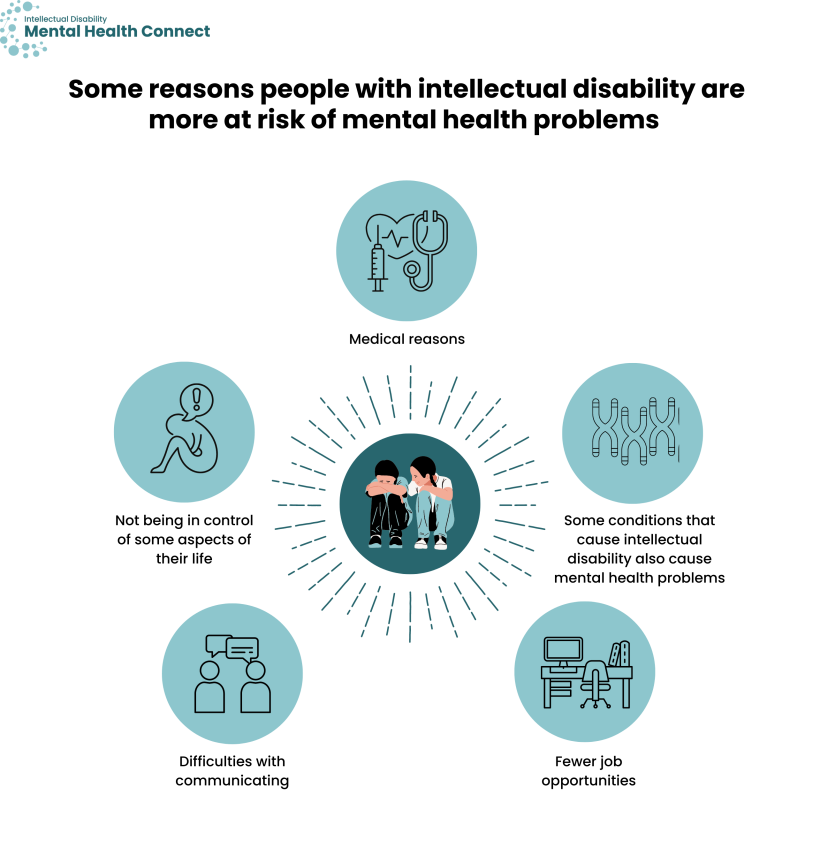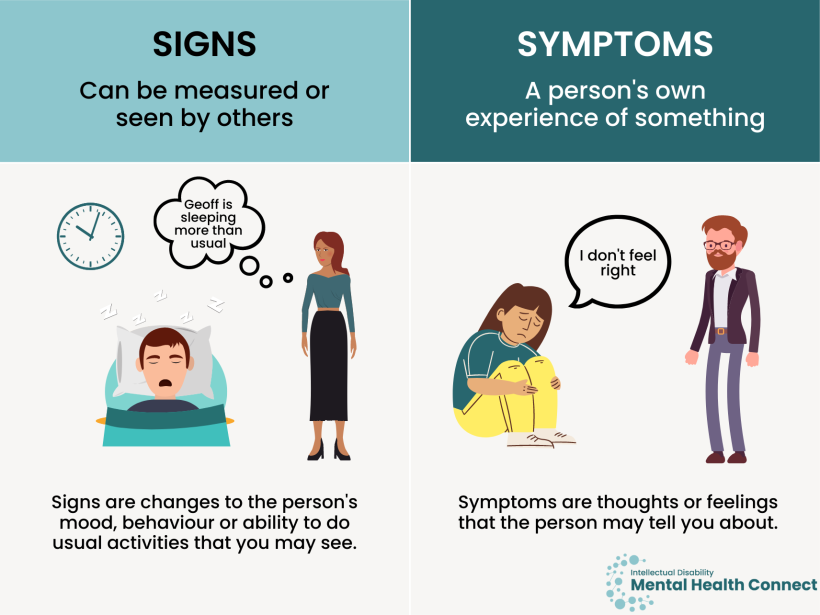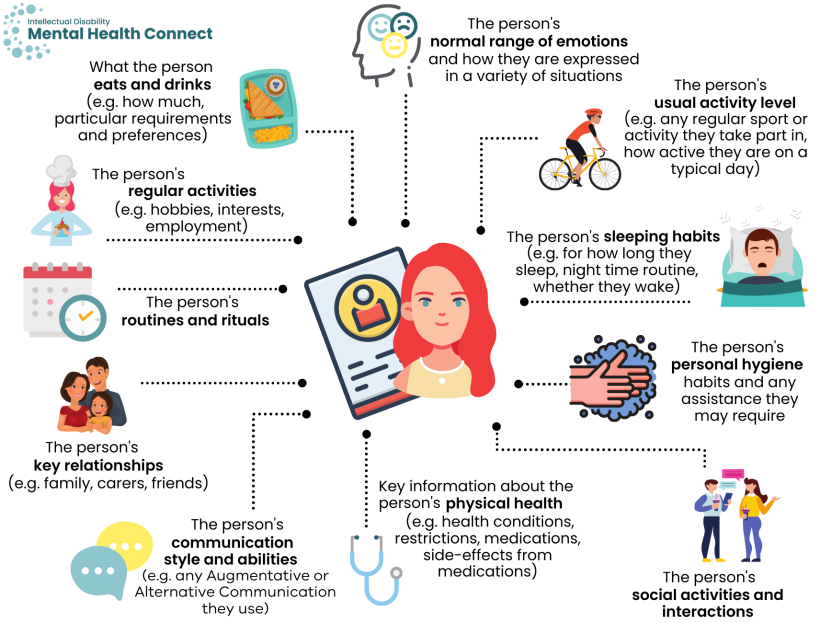Jump to a section below
Risk of mental health problems
People with intellectual disability are more likely to have mental health problems than people without intellectual disability. There are many different reasons for this including:
- difficulties with communicating
- not being in control of some aspects of their life
- fewer job opportunities
- some conditions that cause intellectual disability also cause mental health problems
- medical reasons.
While the risk of having mental health problems is higher for people with intellectual disability, this does not mean that they will necessarily experience difficulties.
However, it is important to be aware of this risk as it may help you to recognise signs of mental health problems and be able to assist the person you support to get help early.
For more introductory information about mental health and intellectual disability see About mental health and Intellectual Disability.

Recognising mental health problems
It can be hard to recognise if a person with intellectual disability has a mental health problem. Many people do not let their family and supporters know that they are having difficulties with their mental health. They may not understand why they are feeling this way or how to let you know. The best way to tell if a person you support has a mental health problem is to look for signs and symptoms.
Signs are changes to the person’s mood, behaviour or ability to do usual activities that you may see. For example:
- not wanting to do activities they usually enjoy
- withdrawing from friends and family
- changes in their sleep (e.g. sleeping more or less than usual)
- changes in appetite (e.g. eating more or less than usual).
Symptoms are thoughts or feelings that the person may tell you about. For example:
- “I don’t feel right.”
- “I’m confused.”
- “I’m sad.”
- “I’m worried/scared.”
- “I can’t sit still.”

- If the person you support has communication difficulties, it can be hard for them to communicate symptoms to you. This means it is important to recognise changes to their usual behaviour and ability to do usual activities. Use these signs to help identify if the person is experiencing a mental health problem.
- Even for people who do not have communication difficulties, behavioural changes are common when the individual is experiencing mental health problems.
Not all changes to behaviour and ability to do usual activities will mean that the person has a mental health problem (see below for how behaviour can be an indicator of other issues). However, noticing these changes means that the person can get help early if they are experiencing a mental health problem.
For information about helping people to notice mental health problems, the Council for Intellectual Disability has a good Easy Read guide on mental health.
Signs of common mental health problems
Below are some signs that could indicate two mental health problems for people with intellectual disability. While not a complete list of signs or mental health problems, it can provide some examples of how mental health problems can appear for people with intellectual disability.
Depression
Depression is a continuing low mood and loss of interest or pleasure in activities. It is different from general sadness because it lasts for a long time and has a significant effect on a person’s life. For general information on depression and common symptoms, see Beyond Blue or healthdirect. These websites also have information about other types of mental health disorders.
Some signs of depression you may look for in a person with intellectual disability:
- sad/flat facial expressions (e.g. less smiling, appears tearful)
- refusing to take part in normal activities or takes part but does not seem to enjoy them
- withdrawing from others (i.e. family, friends, and carers)
- physical problems (e.g. headaches, weight loss or gain, pain)
- anger (e.g. shouting, swearing, screaming, lashing out at others)
- refusing to eat meals, throws them away or spits out the food
- apparent decrease in skills
- seeking lots of reassurance that they are doing well or that they are a good person.
Generalised Anxiety Disorder
People with generalised anxiety disorder have long periods of worry about lots of different things, many of which may seem minor to others. These worries are not just in response to stressful situations and interfere with the person’s life.
For information on generalised anxiety disorder and common symptoms see Beyond Blue and healthdirect.
Some signs of generalised anxiety disorder you may look for in a person with intellectual disability:
- refusing to take part in activities or situations that may result in anxiety
- agitated or repetitive behaviours
- changes to expression or emotions (e.g. may seem more irritable)
- becoming more attached to carers
- physical problems (e.g. chest pain, stomach pain, nausea, headaches)
- asking for water or coughing as they have a dry mouth or difficulty swallowing
- easily fatigued.
For more information on signs of mental illness in people with intellectual disability, 3DN’s Intellectual Disability Health Education has a free course called Specific Mental Illnesses – A Course for Carers.
Ways to recognise when there are changes to the person’s usual behaviours and ability to do activities
In order to recognise when there are changes to the behaviour and ability to do usual activities of the person you support, you need to know what is usual for the person. It is helpful to have a written record of the person’s usual behaviour and ability to do activities when they are feeling well.
Writing down information about the person’s usual behaviour and ability to do activities means:
- you can give other people who provide support to the person insight into what is usual
- it is possible for people who do not know the person well to recognise signs that something is wrong
- it is easier to give health and mental health professionals clear information about what the person’s usual wellbeing is like
- it can help mental health professionals to diagnose mental illness.
Some information that you may want to record includes:

If you have noticed changes to the person’s behaviour and ability to do usual activities, you can record these changes and discuss them with the person you support, their GP or other health professionals as necessary.
Some professionals may assume a certain behaviour is due to the person’s intellectual disability, especially if they do not know the person well.
- If you know that the behaviour is not due to the person’s intellectual disability, let the professional know that this is a change and not normal for the person you support.
Resources for recording changes
- 3DN has a Wellbeing Record that can help you to record information about the person you support. It will guide you through recording information about the person’s usual behaviours and level of functioning, and any changes to these behaviours and level of functioning.
- For more information about how to detect and record changes, 3DN’s Intellectual Disability Health Education has a free intellectual disability mental health e-learning course for carers that includes a module on detecting changes in mental health and wellbeing. The course can be accessed after a quick and free registration on the site. Disability professionals may be interested in the course Recognising Common Mental Illness, which can be accessed at a low cost.
Behaviour as an indicator of physical or other issues
Changes in behaviour may not necessarily be due to mental health problems. Behaviour is a form of communication, and there can be many reasons for changes in behaviour, including:
- physical health problems, such as pain, a toothache, earache, or urinary tract infection
- stress or trauma
- change in environment, such as a new workplace or house
- social factors, such as changes in support or friendship difficulties.
If you are concerned about a change but are unsure if it is due to a mental health problem, you can seek advice and help from a GP. The GP can rule out any physical health problems. You should also consider whether it may be due to a change in the person’s environment or social situation.
